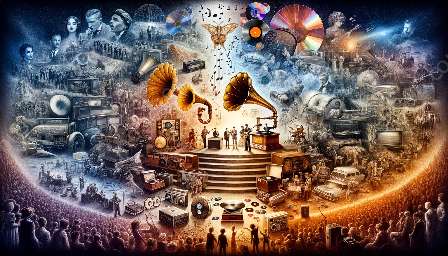Radio advertisement has undergone significant changes over the years, impacting the revenue of the music industry. Understanding the evolving role of radio in the music business is essential to grasp its influence on industry revenue.
Role of Radio in the Music Industry
Radio has historically played a vital role in the music industry. It has been a primary medium for promoting and popularizing music, serving as a platform for artists to reach a wider audience. Through radio, new talents have been discovered, and listeners have been introduced to diverse genres and styles.
Radio stations have served as a medium for music companies to market and advertise new releases and upcoming concerts, thereby contributing to the revenue generated by the music industry. However, the impact of radio advertisement on music industry revenue has evolved with changing trends in the industry.
Changing Trends in Radio Advertisement
With the advent of digital media and streaming platforms, the landscape of radio advertisement has transformed. Traditional radio advertising has been complemented, and in some cases, overtaken by online platforms and social media. This shift has forced radio stations to adapt their advertisement strategies to remain competitive and relevant in the modern music industry.
One of the changing trends in radio advertisement is the integration of digital marketing techniques. Radio stations are increasingly utilizing social media, website banners, and targeted online ads to reach their audiences. This shift has allowed for more precise and data-driven advertising, enabling radio stations to better target music enthusiasts and potential consumers.
Additionally, the rise of streaming services has led to a change in how radio stations promote music. Many stations now focus on creating curated playlists and niche shows, catering to specific music preferences and demographics. This shift has impacted the way music is marketed and exposed through radio, influencing the revenue streams of the music industry.
Furthermore, radio advertisement has seen a shift towards more integrated sponsorships and endorsements. Brands and products are increasingly becoming integrated into radio segments and shows, blurring the lines between traditional advertisements and content. This trend has provided new revenue opportunities for radio stations and has influenced the dynamics of music promotion and exposure.
Impact on Music Industry Revenue
The changing trends in radio advertisement have had a notable impact on music industry revenue. As traditional radio advertising competes with digital platforms, the dynamics of revenue generation have evolved. The shift towards digital marketing and online integration has provided new revenue streams for radio stations, allowing them to diversify their income sources and collaborate with a wider range of advertisers.
However, this evolution has also presented challenges for music companies and artists. With the changing landscape of radio advertisement, the traditional model of promoting music through radio airplay and advertisements has shifted. Music companies now have to navigate a complex ecosystem of digital and traditional advertising, impacting the allocation of resources and marketing strategies.
Nevertheless, the impact of radio advertisement on music industry revenue remains significant. Radio still holds considerable influence over listeners and music enthusiasts, and strategic advertisement placements can lead to increased sales and exposure for artists and music companies.
Conclusion
The changing trends in radio advertisement have redefined the role of radio in the music industry and have had a tangible impact on industry revenue. Understanding these trends is essential for music businesses to adapt their marketing strategies and revenue models accordingly. As radio continues to evolve in the digital age, its influence on the music industry will continue to shape the way music is promoted, marketed, and consumed.









































